Four More Years
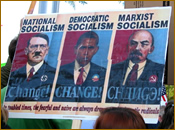 Not every member of my family supports the President. Some are aghast at the idea of ever watching MSNBC. My mother believes that previous attempts I’ve made to obtain employment in the United States were de-railed by the economic policies of the man she calls “The Bamster”. My father opposes what he refers to as the President’s “European Social Democratic” ideas. However, his denunciations are relatively mild, and sometimes his criticisms are valid: for example, he doesn’t understand why the President set aside the recommendations of the Simpson Bowles Commission to reduce the deficit. In contrast, most of the invective I’ve heard is generally much more extreme and nonsensical. Mother Jones recently published a chart detailing all the prevailing conspiracy theories surrounding President Obama: the accusations range from him being Muslim, to secretly homosexual, to openly Communist. Never mind that many of these allegations are contradictory, the theories solely exist to prove the President’s unrelenting malevolence.
Not every member of my family supports the President. Some are aghast at the idea of ever watching MSNBC. My mother believes that previous attempts I’ve made to obtain employment in the United States were de-railed by the economic policies of the man she calls “The Bamster”. My father opposes what he refers to as the President’s “European Social Democratic” ideas. However, his denunciations are relatively mild, and sometimes his criticisms are valid: for example, he doesn’t understand why the President set aside the recommendations of the Simpson Bowles Commission to reduce the deficit. In contrast, most of the invective I’ve heard is generally much more extreme and nonsensical. Mother Jones recently published a chart detailing all the prevailing conspiracy theories surrounding President Obama: the accusations range from him being Muslim, to secretly homosexual, to openly Communist. Never mind that many of these allegations are contradictory, the theories solely exist to prove the President’s unrelenting malevolence.
While the aspersions cast on the President are often irrational, there is a rationale behind them: the concept of a “paradigm shift” has been worn out by political science scholars, but it is fair to say that President Obama represents a rupture. The certainties of an older America, more reflective of Norman Rockwell prints than the nation’s actual state of mind in ages past, are disappearing: America is becoming more ethnically diverse, its position as a world leader has become increasingly challenged, and it is becoming obvious that supposedly “socialist” Europeans or Canadians don’t necessarily live more poorly than Americans do. Certainly, if you’ve made it in America, then you get more jouissance out of that achievement than you might elsewhere. But is the average American that far ahead of the average Australian, Canadian or German? Or do the latter have advantages that would be welcomed by most Americans? President Obama apparently thinks so. But this isn’t the American way, or at least, what has hitherto been perceived to be the American way. Some ask: who is this liberal elitist who casts his eyes across the ocean and wants to incorporate the ideas arising from other lands; in the process of assimilating the experiences of elsewhere, will he undo that which makes America unique? What they don’t ask is if some of what makes America exceptional, such as its lack of gun control laws or a comprehensive health system, are not things of which one should be proud.
My other half has American relatives. Her uncle suggested we watch a documentary about President Obama which had been put together by Dinesh D’Souza, the conservative writer. We saw, or rather, endured it. Its primary thesis is as follows: the consistent thread in Obama’s thinking is “anti-colonialism”. After all, Obama’s father, a Kenyan whose life chances were constrained by the confines of British rule, held strong anti-colonial views; according to D’Souza, Obama had apparently set himself the task of fulfilling his father’s vision. What Obama inherited from his dad was supposedly re-enforced by an education that included mentoring by the late Frank Marshall Davis, a poet and journalist. It’s alleged that Davis was a member of the Communist Party at one point in his life: he certainly was a man of the left. He worked with trade unions and thought “race”, per se, was more a social than a biological construct and thus racism was an immoral fiction which should be eliminated. Davis apparently once said of his activism between 1935 and 1948: “I worked with all kinds of groups. I made no distinction between those labeled Communist, Socialist or merely liberal. My sole criterion was this: Are you with me in my determination to wipe out white supremacy?”
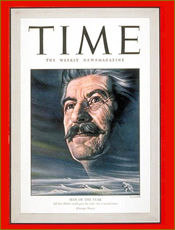 The Thirties and early Forties were also a period in which many people thought that the Soviet Union had somehow avoided the ravages of the Great Depression without resorting to Fascism and its brutal necessities of militarism and racism. The Soviets’ reputation was further enhanced by the bravery and sacrifices made by the Russian people during World War II; Churchill once noted in a meeting with Stalin that the British public had become “pinker”. Stalin replied that this was a “sign of good health”. The United States was not immune: Stalin was made Time Magazine’s man of the year for 1942, despite the fact that he was a brutal tyrant who terrorised and murdered his people in numbers that far exceeded those which resulted from Hitler’s atrocities. The point is, Marshall Davis was swimming along in a broader current. By being on the conspicuous Left in the Thirties and Forties, in particular by working with trade unions, he opened himself up to the allegation of being a “Communist” henceforth and forevermore. Never mind that a change of heart seems to be a feature of many figures on the right, such as Ronald Reagan, who was once a New Deal Democrat, and David Horowitz, who described himself as a “Red Diaper Baby”: if you once associated with Communists and you didn’t fully exit the Left, in the D’Souzan world view, you’re still a Communist regardless of any sign that you have mellowed. And furthermore, your Communism also touches the lives of everyone around you, and influences young people to become Marxists as well.
The Thirties and early Forties were also a period in which many people thought that the Soviet Union had somehow avoided the ravages of the Great Depression without resorting to Fascism and its brutal necessities of militarism and racism. The Soviets’ reputation was further enhanced by the bravery and sacrifices made by the Russian people during World War II; Churchill once noted in a meeting with Stalin that the British public had become “pinker”. Stalin replied that this was a “sign of good health”. The United States was not immune: Stalin was made Time Magazine’s man of the year for 1942, despite the fact that he was a brutal tyrant who terrorised and murdered his people in numbers that far exceeded those which resulted from Hitler’s atrocities. The point is, Marshall Davis was swimming along in a broader current. By being on the conspicuous Left in the Thirties and Forties, in particular by working with trade unions, he opened himself up to the allegation of being a “Communist” henceforth and forevermore. Never mind that a change of heart seems to be a feature of many figures on the right, such as Ronald Reagan, who was once a New Deal Democrat, and David Horowitz, who described himself as a “Red Diaper Baby”: if you once associated with Communists and you didn’t fully exit the Left, in the D’Souzan world view, you’re still a Communist regardless of any sign that you have mellowed. And furthermore, your Communism also touches the lives of everyone around you, and influences young people to become Marxists as well.
Of course, most reasonable people would concede the process of mentoring and maturing is not like a viral transmission, but we are not contending with rational perspectives. D’Souza also embroidered his “anti-colonial” thesis by referring to Obama’s supposed decision to send a bust of Winston Churchill back to Britain; it had hitherto sat in the Oval Office. As it turns out, there were two busts of Winston Churchill in the White House, one of which was returned to the British Embassy in Washington as a matter of course after President Bush’s term expired. But even if it had been a deliberate choice on Obama’s part not to keep both, it’s too glib to suggest that this move was merely due to “anti-colonialism”; it’s just as plausible to say that a key part of Obama’s appeal in 2008 was his desire to break with the President Bush’s warlike policies. While Winston Churchill represented the bulldog spirit of Britain during World War II, he was less talented as a peacetime leader; furthermore, Churchill’s visage could suggest the psychology of a nation under siege. Did Obama want to send messages to leaders meeting him at the White House that he still saw America as being combative? Or rather, did he want to ensure that conciliation was his theme? It is reasonable to say that this was an unfortunate oversight and a public relations mistake: it would have been much more adroit if the President had asked for a bust of William Wilberforce, the man who fought against the slave trade, in Churchill’s place. Nevertheless, the motivations behind this incident may have had nothing to do with feelings about colonialism: we just don’t know. It’s arrogant to presume that we do, and turning it into an accusation smacks of paranoia.
D’Souza’s final innuendo is that Obama is deliberately bankrupting the United States. Beggaring America will bring it to the level of Third World countries; this, D’Souza states, is necessary in order to achieve equality and smash colonialism. There is indeed a debt problem, and the deficits have been mounting. However, to suggest that President Obama has a deliberate plan to crash America into the buffers ignores the separation of powers and checks and balances: he could not do it unless Congress went along with him. This idea also suggests that there aren’t enough patriotic Americans within the Democratic Party to prevent such a figure leading them, nor are there sufficient numbers to constrain him. In other words, this is a patently absurd suggestion; it also ignores the fact that the last time the budget was in surplus was under Bill Clinton, a Democratic president. This thesis also conveniently forgets that the Republican House of Representatives simply will not allow taxes to rise to match outgoings. Furthermore, when the Republicans last controlled Congress and the White House, deficits were not brought under control, they exploded. After the financial crisis hit, President Obama was obliged (in some cases by his predecessor) to support banks and major companies: fortunately, the government is now in a position to divest itself of General Motors shares and AIG recently repaid their loan. Obama also had to grapple with another problem: in order for the economy to grow, demand had to come from somewhere. This led to messy, often unfocused spending on programmes of limited utility, rather than emulation of purposeful schemes like the Tennessee Valley Authority as under the New Deal or National Broadband in modern Australia. The same churning, sludgy machinery which hampers American government also produced health care legislation which does more good than harm, but nevertheless, contains kickbacks and other elements that a body truly focused on the common good would not approve. Never mind, D’Souza says, what seems to be gross dysfunction and beyond the ability of one man to fully manipulate or manage, is actually the brilliant execution of a deliberate plan.
The film is somewhat out of date: D’Souza concluded by stating that should Obama be re-elected America in 2016 would be very different from the one we know today. Certainly: but one of America’s strengths is that it is based on a dynamic rather than fixed idea. As the President has reminded us, the Constitution opens by stating, “We the People of the United States, in order to create a more perfect Union”. The key words are “more perfect”: pristine government wasn’t achieved when the document was enacted, rather the Constitution spliced into the nation’s DNA a desire and a process to reach towards ever better. Paralysis for such a society represents its death: as it lives, naturally, it will evolve.
All in all, D’Souza presented a mixture of fantasies and falsehoods which deserves little but derision. But the problem is that D’Souza’s ideas represent a credo for many of President Obama’s antagonists: rather like teenage romantic love, this is a perspective which withstands the assault of reason. When President Obama took two Bibles (one belonging to Lincoln, the other to Martin Luther King) in his hand, swore the oath, spoke the words of his stirring Inaugural Address and then stepped off the podium, he must have had a thought stirring in the recesses of his mind that would have to wrestle with this for four more years. I don’t envy him: whatever he achieves will be done against fierce, visceral opposition. If he triumphs to the good of America and world, he will have earned his place in the pantheon of great Presidents.

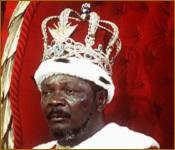 I couldn’t help but think of this film when I heard about France’s intervention in Mali. France is the only European power that presently maintains bases in Africa: they simply did not get the message, as eloquently expressed in Harold MacMillan’s “Wind of Change” speech in 1960, that the presence of European powers in Africa was no longer wanted nor desirable. Not only does the French military remain, France also provides its former colonies with a currency, the CFA Franc, and regularly involves itself in African politics. Sometimes this is positive: in 1979, the French deposed Jean-Bédel Bokassa, the dictator who ruled the Central African Republic. He was so wildly over the top in his pretensions that in 1976 he turned his Republic into a grotesque Empire and had himself crowned Emperor. Among the crimes against humanity that he is supposed to have committed, he turned cannibal. This form of self-indulgence was perversely apropos given how he had otherwise swallowed the country’s wherewithal; a minister who objected to Bokassa’s extravagance and tried to instigate a rebellion, Alexandre Banza, was apparently slashed by the dictator with a razor in front of the other members of the cabinet. Bokassa’s guards then beat Banza until his back was broken and shot him on the streets of the capital, Bangui. Le Monde said this murder was “so revolting that it still makes one’s flesh creep”. Such behaviour ensured no one objected when Bokassa was deposed.
I couldn’t help but think of this film when I heard about France’s intervention in Mali. France is the only European power that presently maintains bases in Africa: they simply did not get the message, as eloquently expressed in Harold MacMillan’s “Wind of Change” speech in 1960, that the presence of European powers in Africa was no longer wanted nor desirable. Not only does the French military remain, France also provides its former colonies with a currency, the CFA Franc, and regularly involves itself in African politics. Sometimes this is positive: in 1979, the French deposed Jean-Bédel Bokassa, the dictator who ruled the Central African Republic. He was so wildly over the top in his pretensions that in 1976 he turned his Republic into a grotesque Empire and had himself crowned Emperor. Among the crimes against humanity that he is supposed to have committed, he turned cannibal. This form of self-indulgence was perversely apropos given how he had otherwise swallowed the country’s wherewithal; a minister who objected to Bokassa’s extravagance and tried to instigate a rebellion, Alexandre Banza, was apparently slashed by the dictator with a razor in front of the other members of the cabinet. Bokassa’s guards then beat Banza until his back was broken and shot him on the streets of the capital, Bangui. Le Monde said this murder was “so revolting that it still makes one’s flesh creep”. Such behaviour ensured no one objected when Bokassa was deposed.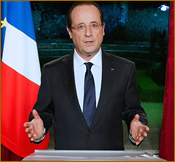 There are good reasons to believe that this intervention will fail. The French defence minister, Jean-Yves Le Drian, has said that “Operation Serval” will continue as long as necessary: apparently President Hollande is determined to “eradicate the terrorists”. As America’s decade in Afghanistan has illustrated, such “eradication” is difficult to achieve. One can think that progress is being made only to find that the insurgents are suddenly re-vivified. Mali resembles Afghanistan in another respect: its government lacks popular support. The Malian state is rightly perceived as being run by criminals; it’s only there due to a coup d’etat. A quick look at the
There are good reasons to believe that this intervention will fail. The French defence minister, Jean-Yves Le Drian, has said that “Operation Serval” will continue as long as necessary: apparently President Hollande is determined to “eradicate the terrorists”. As America’s decade in Afghanistan has illustrated, such “eradication” is difficult to achieve. One can think that progress is being made only to find that the insurgents are suddenly re-vivified. Mali resembles Afghanistan in another respect: its government lacks popular support. The Malian state is rightly perceived as being run by criminals; it’s only there due to a coup d’etat. A quick look at the 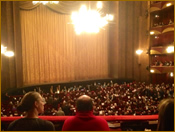 At the end, there will be a beginning. New Year’s Eve heralds the premiere of a new production of Donizetti’s largely forgotten work, “Maria Stuarda” at New York’s Metropolitan Opera. The lead role of Mary, Queen of Scots will be performed by the well known mezzo-soprano, Joyce DiDonato. I can imagine what it will be like: the vast auditorium in Lincoln Centre will darken, the crystal chandeliers will rise as their light diminishes. The transfixed audience will be a varied bunch: their attire will range from jeans to black tie. Perhaps on a night as auspicious as New Years Eve and a premiere, those in formal dress will be in greater numbers than usual.
At the end, there will be a beginning. New Year’s Eve heralds the premiere of a new production of Donizetti’s largely forgotten work, “Maria Stuarda” at New York’s Metropolitan Opera. The lead role of Mary, Queen of Scots will be performed by the well known mezzo-soprano, Joyce DiDonato. I can imagine what it will be like: the vast auditorium in Lincoln Centre will darken, the crystal chandeliers will rise as their light diminishes. The transfixed audience will be a varied bunch: their attire will range from jeans to black tie. Perhaps on a night as auspicious as New Years Eve and a premiere, those in formal dress will be in greater numbers than usual.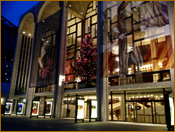 The train eventually slid into a tunnel; after a few minutes, we arrived at Penn Station. A subway ride eventually led us to Lincoln Centre; upon seeing its white modern buildings, I smiled again. I recalled an occasion in 1988 when my father was away on a business trip and left behind a ticket for a performance of “La Bohème” which starred Luciano Pavarotti and Mirella Freni; I went with my mother. I remember how Pavarotti’s voice reverberated throughout the auditorium as he sang “Che gelida manina” and how tenderly Freni responded with “Sì, Mi chiamano Mimì”.
The train eventually slid into a tunnel; after a few minutes, we arrived at Penn Station. A subway ride eventually led us to Lincoln Centre; upon seeing its white modern buildings, I smiled again. I recalled an occasion in 1988 when my father was away on a business trip and left behind a ticket for a performance of “La Bohème” which starred Luciano Pavarotti and Mirella Freni; I went with my mother. I remember how Pavarotti’s voice reverberated throughout the auditorium as he sang “Che gelida manina” and how tenderly Freni responded with “Sì, Mi chiamano Mimì”. The holiday season, as the cliché goes, is a time of family, and this often entails seeing relatives that one doesn’t encounter regularly. Several days ago, my father invited his brothers and sisters to the family home for a meal; it was an altogether Italian affair, with rice balls, eggplant rollatini and strong red wine on the table.
The holiday season, as the cliché goes, is a time of family, and this often entails seeing relatives that one doesn’t encounter regularly. Several days ago, my father invited his brothers and sisters to the family home for a meal; it was an altogether Italian affair, with rice balls, eggplant rollatini and strong red wine on the table.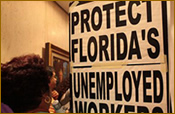 Go into a suburban neighbourhood: yes, some houses are pristine and elegant, others seem less well kept, more patched together, the lawns less tidy. Night in Florida as a result is more visually attractive than the day: darkness softens the rough edges, moonlight reflects off the ponds, lakes and the ocean, giving the tableaus a gentle glow. As one drives around, the artificial lights make the discount stores in scattered shopping plazas look more grand than they are. Young people congregate outside a Chinese “all you can eat” restaurant; the dim light helps to hide the fact that their attire is direct from Wal Mart. Drive along further, and in a ditch near a hotel, two young men wearing backwards facing baseball caps walk gingerly, heading towards the highway. Night, and the egregious use of electricity make this scene seem more tranquil than it probably is: after hitting a peak of 11.3% in March 2010, Florida’s unemployment rate is now hovering at 8.1%. This rate still puts it above the national average;
Go into a suburban neighbourhood: yes, some houses are pristine and elegant, others seem less well kept, more patched together, the lawns less tidy. Night in Florida as a result is more visually attractive than the day: darkness softens the rough edges, moonlight reflects off the ponds, lakes and the ocean, giving the tableaus a gentle glow. As one drives around, the artificial lights make the discount stores in scattered shopping plazas look more grand than they are. Young people congregate outside a Chinese “all you can eat” restaurant; the dim light helps to hide the fact that their attire is direct from Wal Mart. Drive along further, and in a ditch near a hotel, two young men wearing backwards facing baseball caps walk gingerly, heading towards the highway. Night, and the egregious use of electricity make this scene seem more tranquil than it probably is: after hitting a peak of 11.3% in March 2010, Florida’s unemployment rate is now hovering at 8.1%. This rate still puts it above the national average;  As Christmas draws closer, I find everything I do bears an increasing sense of urgency. Upon completing a task, I wonder “Is this it?”: is this the last thing I have to do before I can finish for the year? I frequently harbour visions of sitting on a comfortable sofa with a brightly lit tree and a warm, glowing fireplace in the background. I can imagine picking up a cup of hot apple cider, taking a sip and getting a sharp kick of fruit and cinnamon, and then realising that there is nothing left to be done, at least until we’ve stepped into January. Until that moment, however, there are lists, tasks and errands. Bags are there to be packed, presents are there to be wrapped, the car is there to be fuelled up and driven far on visits to friends and family. The list eventually peaks, and then winds down, leading to that quiet moment when stress finally dissolves, but it wouldn’t be Christmas if there wasn’t a last minute tidal surge of things to do.
As Christmas draws closer, I find everything I do bears an increasing sense of urgency. Upon completing a task, I wonder “Is this it?”: is this the last thing I have to do before I can finish for the year? I frequently harbour visions of sitting on a comfortable sofa with a brightly lit tree and a warm, glowing fireplace in the background. I can imagine picking up a cup of hot apple cider, taking a sip and getting a sharp kick of fruit and cinnamon, and then realising that there is nothing left to be done, at least until we’ve stepped into January. Until that moment, however, there are lists, tasks and errands. Bags are there to be packed, presents are there to be wrapped, the car is there to be fuelled up and driven far on visits to friends and family. The list eventually peaks, and then winds down, leading to that quiet moment when stress finally dissolves, but it wouldn’t be Christmas if there wasn’t a last minute tidal surge of things to do.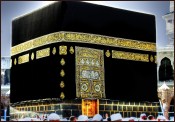 I took my seat in the barber’s chair as he began to pray. As I looked up, I noted, as I had many times before, a gilded picture of the Holy Kaaba which he had carefully stuck to the wall. Mr. Khan’s previous client counted his money. Again, absolute silence prevailed. As Mr. Khan finished, two more gentlemen came in: one was elderly and wore a Pakul, a hat most commonly associated with Afghanistan. I don’t understand what he said, but I believe I heard the word “mosque”. Perhaps he wondered why they were praying in a barber’s shop given that there was a large one less than a block away. He cast a glance at me: his gaze was not hostile, but rather curious. After a moment, he went out again. Mr. Khan rolled up his rug, put it away. He then turned his attention to cleaning me up. Two more clients came in and took their seats. They and Mr. Khan conversed mainly in Urdu for a time. The words “Matte” and “High Gloss” were spoken. I can only assume that they were either talking about photography or paint.
I took my seat in the barber’s chair as he began to pray. As I looked up, I noted, as I had many times before, a gilded picture of the Holy Kaaba which he had carefully stuck to the wall. Mr. Khan’s previous client counted his money. Again, absolute silence prevailed. As Mr. Khan finished, two more gentlemen came in: one was elderly and wore a Pakul, a hat most commonly associated with Afghanistan. I don’t understand what he said, but I believe I heard the word “mosque”. Perhaps he wondered why they were praying in a barber’s shop given that there was a large one less than a block away. He cast a glance at me: his gaze was not hostile, but rather curious. After a moment, he went out again. Mr. Khan rolled up his rug, put it away. He then turned his attention to cleaning me up. Two more clients came in and took their seats. They and Mr. Khan conversed mainly in Urdu for a time. The words “Matte” and “High Gloss” were spoken. I can only assume that they were either talking about photography or paint. The news of the Royal Pregnancy was probably greeted with celebrations down at Number 10 Downing Street. It’s easy to imagine the unholy trinity of Cameron, Osborne and Gove popping open a bottle of vintage champagne in the Cabinet room, filling their glasses and raising a toast to the pending arrival. I imagine such a celebration wouldn’t be solely animated by royalist ardour, rather, I suspect that it would also be an example of the kind of elation experienced by drowning men who had just been saved. No more lurid tales of economic failure and of
The news of the Royal Pregnancy was probably greeted with celebrations down at Number 10 Downing Street. It’s easy to imagine the unholy trinity of Cameron, Osborne and Gove popping open a bottle of vintage champagne in the Cabinet room, filling their glasses and raising a toast to the pending arrival. I imagine such a celebration wouldn’t be solely animated by royalist ardour, rather, I suspect that it would also be an example of the kind of elation experienced by drowning men who had just been saved. No more lurid tales of economic failure and of 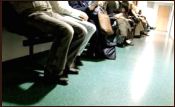 No wonder the champagne likely flows down at 10 Downing Street; their thoughts need not focus so much on places like the Bradford Royal Infirmary, where queues for non-emergency treatment can lead to four to five hour waiting times. The doctors there are under pressure, the nurses as polite as endless tension allows. Patients sit in quiet agony in the waiting room, awaiting healing hands to be free to alleviate their suffering. The funds to ameliorate this situation are not there, allocated not just to Royal priorities through the Civil List but also towards providing sustenance to banks whose commitment to civic responsibility is as absent as their common sense. A Royal infant averts the gaze of the second country from itself: it doesn’t look at the back streets of Manchester in which young unemployed men sit on doorsteps and smoke cigarettes and mothers hang their washing on clotheslines in the uncertain December weather. The first country is all show; the second country looks up, sees it, smiles and infrequently considers the contrast.
No wonder the champagne likely flows down at 10 Downing Street; their thoughts need not focus so much on places like the Bradford Royal Infirmary, where queues for non-emergency treatment can lead to four to five hour waiting times. The doctors there are under pressure, the nurses as polite as endless tension allows. Patients sit in quiet agony in the waiting room, awaiting healing hands to be free to alleviate their suffering. The funds to ameliorate this situation are not there, allocated not just to Royal priorities through the Civil List but also towards providing sustenance to banks whose commitment to civic responsibility is as absent as their common sense. A Royal infant averts the gaze of the second country from itself: it doesn’t look at the back streets of Manchester in which young unemployed men sit on doorsteps and smoke cigarettes and mothers hang their washing on clotheslines in the uncertain December weather. The first country is all show; the second country looks up, sees it, smiles and infrequently considers the contrast.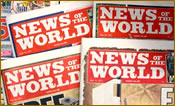 Self regulation of the press in the United Kingdom has failed. The Press Complaints Commission, far from being a fair minded and independent body which protects the individual from trespass by the media, has proven itself to be rather like a bunch of foxes deciding not to eat chicken for lunch after having decimated the henhouse. It is not necessary to once again raise the case of Milly Dowler, to speak of phone hacking or to discuss bribes to the police: the press is more than proven to be crooked, it is seen as being crooked. It is not going to be possible to restore any semblance of ethical behaviour in this industry without the force of law and the heavy hand of its sanction behind it.
Self regulation of the press in the United Kingdom has failed. The Press Complaints Commission, far from being a fair minded and independent body which protects the individual from trespass by the media, has proven itself to be rather like a bunch of foxes deciding not to eat chicken for lunch after having decimated the henhouse. It is not necessary to once again raise the case of Milly Dowler, to speak of phone hacking or to discuss bribes to the police: the press is more than proven to be crooked, it is seen as being crooked. It is not going to be possible to restore any semblance of ethical behaviour in this industry without the force of law and the heavy hand of its sanction behind it.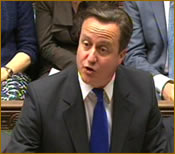 It is all too easy to imagine the following scenario: the Prime Minister will address the Commons, perhaps on the day of publication, perhaps delaying the day of reckoning to several weeks after its release, perhaps as long as after the holidays. He will be effusive in his praise of Lord Leveson and thank him for his work. He will then say that any changes to the law would be difficult and that he would rather err “on the side of liberty” rather than create a system which could be open to abuse later. Next, he will say that he has personally spoken to the editors of the leading newspapers and received solemn undertakings from each of them that they will adhere to a new, tougher code of ethics. This code of ethics will be enforced by a voluntary contract which all the editors have promised to sign; the contract will be in line with proposals from Lord Hunt, the last chairman of the Press Complaints Commission. Cameron will present this as a historic compromise, one which will secure the blessings of a cliché which he will no doubt deploy as a rhetorical flourish. After a time, things will return to precisely as they were before.
It is all too easy to imagine the following scenario: the Prime Minister will address the Commons, perhaps on the day of publication, perhaps delaying the day of reckoning to several weeks after its release, perhaps as long as after the holidays. He will be effusive in his praise of Lord Leveson and thank him for his work. He will then say that any changes to the law would be difficult and that he would rather err “on the side of liberty” rather than create a system which could be open to abuse later. Next, he will say that he has personally spoken to the editors of the leading newspapers and received solemn undertakings from each of them that they will adhere to a new, tougher code of ethics. This code of ethics will be enforced by a voluntary contract which all the editors have promised to sign; the contract will be in line with proposals from Lord Hunt, the last chairman of the Press Complaints Commission. Cameron will present this as a historic compromise, one which will secure the blessings of a cliché which he will no doubt deploy as a rhetorical flourish. After a time, things will return to precisely as they were before. The call came in the middle of the night. For each member of the President’s entourage, the message was the same, delivered with military precision: “Get up, get dressed, the President is leaving in one hour.” Hotel rooms throughout Phnom Penh subsequently echoed with a chorus of crisp cotton sheets being whipped back, the sound of hasty showers being taken and suitcases zipped up.
The call came in the middle of the night. For each member of the President’s entourage, the message was the same, delivered with military precision: “Get up, get dressed, the President is leaving in one hour.” Hotel rooms throughout Phnom Penh subsequently echoed with a chorus of crisp cotton sheets being whipped back, the sound of hasty showers being taken and suitcases zipped up.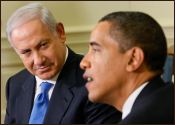 They were in the Oval Office, seated in the two wing chairs standing on either side of the fireplace; the reporters had left after the two leaders had expressed the usual platitudes about the special relationship between America and Israel. The President, finally, could be blunt. The chairs were parallel, they didn’t face each other directly. In reply to Obama’s warning, Bibi turned his head and looked directly at the President; the gaze was hard though not unintelligent. “No,” Netanyahu replied. This was not a refusal which could be reasoned with; Bibi’s world was painted in shades of black and white, Obama mused, you were either with him or against him. At that moment, he’d decided that Obama was against him.
They were in the Oval Office, seated in the two wing chairs standing on either side of the fireplace; the reporters had left after the two leaders had expressed the usual platitudes about the special relationship between America and Israel. The President, finally, could be blunt. The chairs were parallel, they didn’t face each other directly. In reply to Obama’s warning, Bibi turned his head and looked directly at the President; the gaze was hard though not unintelligent. “No,” Netanyahu replied. This was not a refusal which could be reasoned with; Bibi’s world was painted in shades of black and white, Obama mused, you were either with him or against him. At that moment, he’d decided that Obama was against him.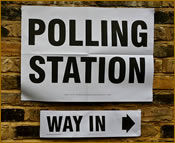 It was a marked contrast to the flashbulbs and glory of President Obama’s re-election; on November 15, I awoke at my usual time, 5:30 AM, fed the cats, made coffee, and took out the trash. Then I walked down to the community centre attached to the local Catholic primary school; the sun was not quite up, but nevertheless it was obvious that it would be a dark day. The clouds seemed to be sitting low, almost hugging the ground at point of the horizon. The lights in many of the houses across the east Bradford skyline were switched on; the city was slowly stirring to life, stretching, yawning, pouring out its cups of tea, turning on its hot showers and getting ready to go to work or school. My footsteps felt heavy; my shoulders had that slight ache that prevails before one’s joints have fully warmed up. At last I arrived at the alabaster brick entrance to the centre; a black and white “Polling Station” sign was stuck to the wall.
It was a marked contrast to the flashbulbs and glory of President Obama’s re-election; on November 15, I awoke at my usual time, 5:30 AM, fed the cats, made coffee, and took out the trash. Then I walked down to the community centre attached to the local Catholic primary school; the sun was not quite up, but nevertheless it was obvious that it would be a dark day. The clouds seemed to be sitting low, almost hugging the ground at point of the horizon. The lights in many of the houses across the east Bradford skyline were switched on; the city was slowly stirring to life, stretching, yawning, pouring out its cups of tea, turning on its hot showers and getting ready to go to work or school. My footsteps felt heavy; my shoulders had that slight ache that prevails before one’s joints have fully warmed up. At last I arrived at the alabaster brick entrance to the centre; a black and white “Polling Station” sign was stuck to the wall.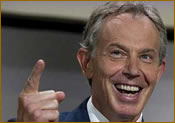 It’s conceivable there will be other important developments: President Obama will need to appoint new cabinet members, some like current UN Ambassador Susan Rice (intended to replace Hillary Clinton as Secretary of State) are controversial and worthy choices. Perhaps if the President wanted to end the year in a proactive way, he could travel to Gaza, Cairo and Jerusalem and try to prevent the situation getting worse. But perhaps the West feels its power to improve the situation is limited, an impression which is exacerbated by the foibles of its representative to the region, Tony Blair. Apart from the fact that his selection was about as apropos as putting Dr. Harold Shipman in charge of a geriatrics ward, the public would be right to ask what Blair’s eighty-plus visits to Jerusalem have achieved apart from earning him loyalty points from airlines and five star hotels. The Palestinians are still on the end of harsh and murderous treatment, Tel Aviv and Jerusalem face rocket fire: Netanyahu says that what he does is to improve Israel’s peace and security and does not get pulled up on his brutality, idiocy or hypocrisy. Indeed, he may be re-elected in January.
It’s conceivable there will be other important developments: President Obama will need to appoint new cabinet members, some like current UN Ambassador Susan Rice (intended to replace Hillary Clinton as Secretary of State) are controversial and worthy choices. Perhaps if the President wanted to end the year in a proactive way, he could travel to Gaza, Cairo and Jerusalem and try to prevent the situation getting worse. But perhaps the West feels its power to improve the situation is limited, an impression which is exacerbated by the foibles of its representative to the region, Tony Blair. Apart from the fact that his selection was about as apropos as putting Dr. Harold Shipman in charge of a geriatrics ward, the public would be right to ask what Blair’s eighty-plus visits to Jerusalem have achieved apart from earning him loyalty points from airlines and five star hotels. The Palestinians are still on the end of harsh and murderous treatment, Tel Aviv and Jerusalem face rocket fire: Netanyahu says that what he does is to improve Israel’s peace and security and does not get pulled up on his brutality, idiocy or hypocrisy. Indeed, he may be re-elected in January. Election Day always makes me think of my grandfather. Had he lived to see this one, he would have been 104 years old; however, I doubt advanced age would have deterred him from going to the polls. I can see him in my imagination: his sparse white hair and twinkling eyes, wearing a neatly pressed brown suit with a gold pin stuck in the lapel and he would be carrying a polished wooden cane. Movement would not come easily to him; he’d need to be driven by a neighbour. Getting out of the car would be problematic; late in life, his inability to move as freely as he once did frustrated him. I recall us washing our hands side by side in an airport bathroom in 1996; my grandfather was irritated by the amount of strength he had to use to get the paper towels out of the dispenser. He told me with a sigh, “It’s not good to get too old.”
Election Day always makes me think of my grandfather. Had he lived to see this one, he would have been 104 years old; however, I doubt advanced age would have deterred him from going to the polls. I can see him in my imagination: his sparse white hair and twinkling eyes, wearing a neatly pressed brown suit with a gold pin stuck in the lapel and he would be carrying a polished wooden cane. Movement would not come easily to him; he’d need to be driven by a neighbour. Getting out of the car would be problematic; late in life, his inability to move as freely as he once did frustrated him. I recall us washing our hands side by side in an airport bathroom in 1996; my grandfather was irritated by the amount of strength he had to use to get the paper towels out of the dispenser. He told me with a sigh, “It’s not good to get too old.”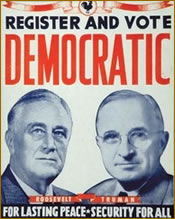 I doubt he would have cared much for Romney; I recall him stating his admiration for Franklin Roosevelt and Harry Truman. He felt more strongly about Truman. I believe there was something about the haberdasher from Missouri: honest, uncompromising, purposeful that struck a chord with him. My grandfather heartily agreed with Truman’s sacking of Douglas MacArthur; I didn’t realise when he told me this what a minority opinion this was. I also believe that Truman’s modest background enhanced my grandfather’s belief in America; he told me that I could be anything I wanted to be “in this wonderful country”. Harry Truman’s improbable rise must have seemed like proof of this proposition. Romney, although he gave away his inheritance, wouldn’t have given my grandfather additional confidence that this idea still held true.
I doubt he would have cared much for Romney; I recall him stating his admiration for Franklin Roosevelt and Harry Truman. He felt more strongly about Truman. I believe there was something about the haberdasher from Missouri: honest, uncompromising, purposeful that struck a chord with him. My grandfather heartily agreed with Truman’s sacking of Douglas MacArthur; I didn’t realise when he told me this what a minority opinion this was. I also believe that Truman’s modest background enhanced my grandfather’s belief in America; he told me that I could be anything I wanted to be “in this wonderful country”. Harry Truman’s improbable rise must have seemed like proof of this proposition. Romney, although he gave away his inheritance, wouldn’t have given my grandfather additional confidence that this idea still held true. I'm a Doctor of both Creative Writing and Manufacturing and Mechanical Engineering, a novelist, a technologist, and still an amateur in much else.
I'm a Doctor of both Creative Writing and Manufacturing and Mechanical Engineering, a novelist, a technologist, and still an amateur in much else.




